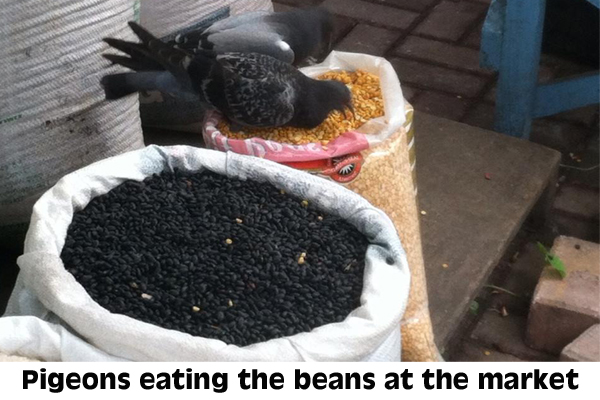Public Health authorities in Belize City informed us Friday that they intend to send out an inspector to the Michael Finnegan Market after we reported finding a flock of about 10 pigeons sitting on open bean sacks one morning while the stall’s vendor was inside his booth talking on the phone.
Anyone who frequents the market can tell you that beans, wangla seed, rice and other commodities sold by the pound are displayed uncovered at the stalls – which is why the pigeons were having their Friday morning feast while the vendor was not looking. Pigeons are infamous for defecating wherever they please.
Internationally, several health authorities have sounded the alarm that pigeon droppings can have germs that make people sick—and in some cases, fatally sick.
Medical News Today (link to study — https://www.medicalnewstoday.com/releases/61646.php) says that, “There are over 60 other diseases that birds and their droppings can carry. The problem is especially worrisome in residential areas, as many of them are airborne and can be transferred to humans just by being around droppings.”
Pigeons carry or are capable of transmitting an amazing variety of diseases from histoplasmosis to West Nile virus, according to the US-based Allstate Animal Control.
“As well as that, there are health risks associated with pigeons – they can carry salmonella, and inhaling particles from droppings can lead to a disease called ornithosis, which is potentially lethal,” a BBC news report, “UK Pigeons: Not a problem to poo-poo” (1999), said.
The New York City Department of Health identifies three human diseases associated with pigeon droppings: histoplasmosis, cryptococcosis, and psittacosis. It notes the following:
Histoplasmosis is a disease caused by a fungus, which grows in pigeon droppings. Symptoms of histoplasmosis begin to appear about 10 days after initial infection and include fatigue, fever, and chest pains.
Cryptococcosis is a fungal disease — some people are more likely than others to get this disease. For these people, cryptococcosis can cause serious symptoms of lung, brain and spinal cord disease, such as headaches, fever, cough, shortness of breath, and night sweats.
Psittacosis or ornithosis is a bacterial disease that, in humans, is characterized by fatigue, fever, headache, rash, chills, and sometimes pneumonia. Symptoms develop about 10 days after exposure. Psittacosis can be treated with a common antibiotic.
The Public Health official told us that they are especially concerned about the interaction of the pigeons with fruits and vegetables which would not be cooked – and which some people may not even venture to wash.

